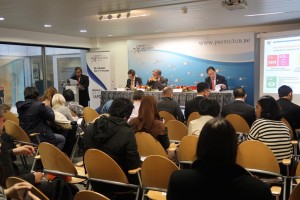CPOPC Opposes EUs Delegated Act

Coordinating Minister for Economic Affairs Darmin Nasution leads the Council of Palm Oil Producing Countries (CPOPC) to meet the European Union (EU). (Photo: Ministry of Foreign Affairs)
The Joint Mission of the Council of Palm Oil Producing Countries (CPOPC) is held in Brussels, Belgium from 8 to 9 April 2019 to oppose the Delegated Regulation Supplementing Directive 2018/2001 of the European Union (EU) Renewable Energy Directive II (Delegated Act).
The event was also aimed at holding a dialog with the EU leaders in order to express the concerns of CPOPC Member Countries.
For the record, the mission is a follow-up to the agreement of the 6th CPOPC Ministerial Meeting which was held on 28 February 2019 in Jakarta, Indonesia. The meeting resulted in an agreement to jointly discuss the discriminatory measures of the EU authorities arising from the Delegated Act.
The CPOPC Member Countries consider the Delegated Act a political compromise within the EU to isolate and exclude palm oil from its mandated renewable energy sector to benefit EU-produced rapeseed oil and other less competitive renewable vegetable oils.
The CPOPC Member Countries are of the view that the proposed Delegated Act is intended to restrict and effectively ban the use of palm oil biofuel in the EU based on the scientifically flawed concept of Indirect Land Use Change (ILUC).
The Delegated Act uses unsubstantiated criteria, while deliberately focus on palm oil and deforestation; on the other hand, it does not attempt to consider broader environmental issues related to the cultivation of other vegetable oils, including rapeseed oil.
In addition, the members also consider that the Delegated Act is a unilateral instrument which targets palm oil producers, thereby blocking the achievement of targets for poverty alleviation and other UN Sustainable Development Goals (SDGs).
CPOPC strongly opposes the Delegated Act which categorizes palm oil as unsustainable due to ‘high risk’ ILUC. CPOPC also expressed belief that the EU uses the Delegated Act to phase out and impose a ban on palm oil imports to promote EU-produced vegetable oil. The CPOPC has also expressed concern that the assumptions were made based on criteria that are not accurate and scientifically discriminatory.
The EU claims that the Delegated Act is based on scientific and environmental reasons are not appropriate. For example, soybean oil is categorized as a low risk even though internal EU research itself has proven that the oil is responsible for far more “imported deforestation”.
This makes the entire Delegated Act questionable. There is a possibility that the Delegated Act is based more on political and economic protectionism than science. CPOPC regards this a planned and detrimental economic and political strategy to get rid of palm oil from the EU market. (PR of Ministry of Foreign Affairs/EN)
Translated by : Fairuzzamani Inayatillah
Edited by : M. Ersan Pamungkas








